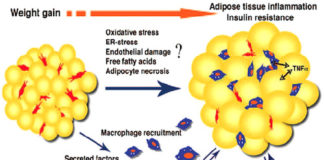Longevity Breakthrough: Scientists ‘Activate’ Life Extension In Worm, Discover Mitochondria’s Metabolic...
If you think life's too short, then you're not alone. A team of scientists set out to find what it would take to live a very long life and they made important discoveries that bring longer life spans much closer to reality. A new research report featured on the cover of The FASEB Journal, describes how scientists "activated" life extension in the roundworm C. elegans, and in the process discovered a new metabolic state correlating with long life.
Walking Slows Progression Of Alzheimer’s
Walking may slow cognitive decline in adults with mild cognitive impairment (MCI) and Alzheimer's disease, as well as in healthy adults, according to a study presented November 29 at the annual meeting of the Radiological Society of North America (RSNA).
More Protein, Less Refined Starch Important For Dieting, Large Study Shows
Researchers at the Faculty of Life Sciences (LIFE), University of Copenhagen, can now unveil the results of the world's largest diet study: If you want to lose weight, you should maintain a diet that is high in proteins with more lean meat, low-fat dairy products and beans and fewer finely refined starch calories such as white bread and white rice. With this diet, most people can also eat until they are full without counting calories and without gaining weight.
Severe Asthma More Prevalent Than Thought, Related To Pronounced Nasal Symptoms
People with multi-symptom asthma more often have night-time awakenings due to asthma-symptoms, a sign of severe asthma. Researchers writing in BioMed Central's open access journal Respiratory Research have shown that asthma with multiple symptoms is more highly prevalent than previously suggested, comprising 20- 25% of all asthmatics.
Diabetes Drug Could Work Against Alzheimer’s, Animal Study Suggests
Metformin, a drug used in type 2-diabetes might have the potential to also act against Alzheimer's disease. This has been shown in a study from scientists of the German Center for Neurodegenerative Diseases (DZNE), the University of Dundee and the Max-Planck-Institute for Molecular Genetics.
Fatty Liver And NASH: The Silent Epidemic
With all the attention focused on the twin epidemics of obesity and Type 2 diabetes, few people are aware of another closely related condition that is rapidly becoming another major epidemic. According to the American Liver Association, fatty liver disease – marked by the abnormal accumulation of fat in the liver – currently affects as many as one in five Americans.
Taking A Break From Osteoporosis Drugs Can Protect Bones, Study Finds
Taking time off from certain osteoporosis drugs may be beneficial to bone health, according to a study conducted at Loyola University Health System. Researchers found that bone density remained stable for three years in patients who took a drug holiday from bisphosphonates, a popular class of osteoporosis drugs that can cause fractures in the thigh bones and tissue decay in the jaw bone.
Light At Night Causes Changes In Brain Linked To Depression
Exposure to even dim light at night is enough to cause physical changes in the brains of hamsters that may be associated with depression, a new study shows. Researchers found that female Siberian hamsters exposed to dim light every night for eight weeks showed significant changes in a part of the brain called the hippocampus.
Scientists Ferret Out A Key Pathway For Aging
For decades, scientists have been searching for the fundamental biological secrets of how eating less extends lifespan. It has been well documented in species ranging from spiders to monkeys that a diet with consistently fewer calories can dramatically slow the process of aging and improve health in old age.
Circuit Regulating Anti-Diabetic Actions Of Serotonin Uncovered
New findings by researchers at UT Southwestern Medical Center suggest that serotonin -- a brain chemical known to help regulate emotion, mood and sleep -- might also have anti-diabetic properties.
Poor Sleep Quality Increases Inflammation, Community Study Finds
People who sleep poorly or do not get enough sleep have higher levels of inflammation, a risk factor for heart disease and stroke, researchers have found. Data from a recent study are scheduled presented Nov. 14 at the American Heart Association Scientific Sessions in Chicago by Alanna Morris, MD, a cardiology fellow at Emory University School of Medicine.
Yoga’s Ability To Improve Mood And Lessen Anxiety Is Linked to...
Yoga has a greater positive effect on a person's mood and anxiety level than walking and other forms of exercise, which may be due to higher levels of the brain chemical GABA according to an article in The Journal of Alternative and Complementary Medicine, a peer-reviewed journal published by Mary Ann Liebert, Inc. The article is available free online.














